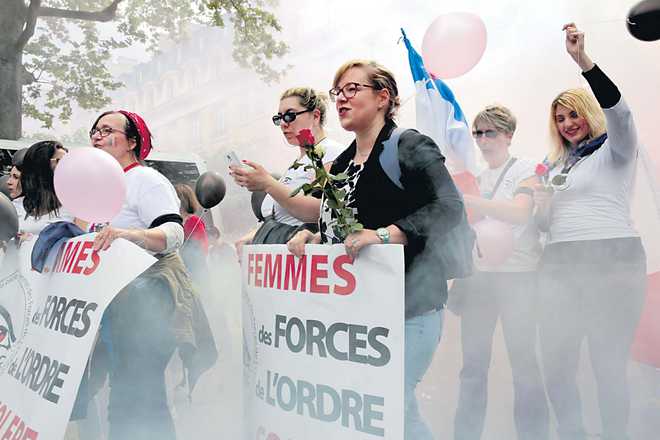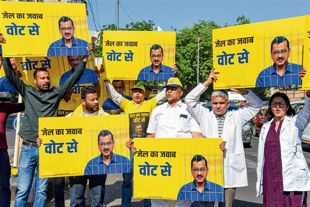
POLL MODE: Directly, indirectly, India will be affected by the outcome.
KC Singh
AS the first phase of the French presidential elections approached on April 23, Europe held its breath as the elimination of candidates favouring the European Union would have sounded its death knell. The EU stood injured after Britain moved its application under Article 50 for severance. Emmanuel Macron’s success lifted European markets and spirits as electoral modelling indicated he should in the second and final round be able to beat his only rival, the right-wing Marine Le Pen, on May 7.
Twelve days later, an election will be held to elect the President of Iran, again in two phases, unless one candidate polls a clear majority. A month later, Britain goes to the polls. Someone on social media wittily remarked that in April, PM May announced elections in June.
In an interconnected world, all these events will impact India, directly or indirectly. The nation, meanwhile — after BJP’s UP victory — is preoccupied with cow protection vigilantism, Kashmir valley, Jharkhand Maoist shooting of CRPF men and the Delhi MC election results. The President of Nepal and Prime Ministers of Malaysia, Australia and Bangladesh were here, but hardly evoked more than casual interest. Perhaps like Trump, even Indians are saying ‘India First’ and the world has no place in their cosmology of human destiny.
However, international issues on Indian television, and thus by implication of concern to viewers, were the extradition proceedings against Vijay Mallya in the UK and the restrictions by the US and Australia on visas for software techies. Finance Minister Arun Jaitley was in the US and raised the H-1B visa with the US Commerce Secretary. These two issues, and the elections in Europe and Iran, need a closer look.
The Mallya extradition proceedings had government’s defenders claiming victory even before a verdict, while detractors queried why he was allowed to flee. India has not had great success at extraditing fugitives from the UK. Besides, the need for dual criminality, i.e. the acts being recognised as crimes in both countries and punishable for more than one year, a number of exceptions are built into British law and practice. For instance, the Naval War Room leak accused, Ravi Shankaran, has successfully pleaded that the Indian judicial process is tortuously slow and extradition was being sought in 2014 when the trial had not even commenced since 2006. An Italian request was turned down by a British magistrate because the jails in Italy were overcrowded. Perhaps the most damaging will be the treatment of Subroto Roy of Sahara by the Supreme Court, jailing him for running contempt in a matter of civil nature.
Thus congratulations are premature. Moreover, the Indian agencies will have to prove money-laundering and fraud. Bad business decision-making and risky borrowing is not necessarily fraud and cheating. Also Mallya’s lawyers will, no doubt, enquire why similar treatment is not being meted out to high-net worth loan defaulters choking the banking system. The government may thus be seen on a Mallya witch-hunt, in line with its black money crusade, for public consumption. That would undermine bona fides of the extradition request.
The French election result is important as France has over the years become a major defence equipment supplier to balance Indian overdependence on Russia in the past and the US now. France and Germany are the core of the EU, which can emerge as a pole in a future world order, only if it remains united. India does not want a new bipolar order dominated by the US and China. A Marine Le Pen presidency promises the demise of EU, social and economic upheaval domestically as populism overtakes prudence and iconoclasm trumps reform. Macron by comparison is a centrist-reformist, who will work with existing institutions, including the EU.
The Iranian presidential elections are always an interplay of selection, exercised by the Guardian’s Council to shortlist desirable candidates, and popular will, as thereafter people are free to choose. The barring of Ahmadinejad, a former President and one-time favourite of the Supreme Leader, indicates Iran does not want a maverick when US President Donald Trump is threatening to overturn the nuclear deal that P5+1 struck with Iran. The popularity of sitting President Hassan Rouhani would be tested as among others he faces a popular conservative Mohammad Bagher Ghalibaf, presently mayor of Teheran, like Ahmadinejad was before his election in 2005. He is also a former deputy commander of the Basij, a paramilitary force used to control public protests or enforce social edicts, and head of the IRGC air force. Unless Trump tones down his Iran rhetoric, Iranian conservative forces may rally behind Ghalibaf.
India-Iran ties have been testy, despite public incantations of bonhomie. PM Narendra Modi’s planned visit to Israel would only increase Iranian wariness. Iran has been silent over the Kulbhushan Jhadav episode about which it must know more if the abduction indeed was from within Iran, as India is alleging. The much-hyped Chabahar project is more or less on the backburner as Iran cogitates linking it to the CPEC. That would negate the very purpose of India helping develop it as a counter-weight to the Chinese control of Gwadar. Rouhani continuing would be a sign of Iran sensing stability in relations with the US. Otherwise, Ghalibaf may be the Iranian answer to US aggressiveness. A paranoid Iran, distracted by its battles against Sunni forces and their Western allies, will be more difficult to engage.
All diplomacy is a factor of domestic politics. With the Hindutva agenda on the ascendant, confrontational approach to Kashmir and testing of Chinese redlines, Indian diplomacy is in uncharted waters. Pankaj Misra in Age of Anger recalls history to explain the rise and success of Modi as ‘fantasy of a strongman who will heal old injuries and achieve closure by forcing the world to recognise Indian power and glory.’ As Nehru discovered with China in 1962, hope is not a policy and myth-making not a strategy. Greatness of India needs more than an extradition of one fugitive or some relief on H-1B visas. It needs for the ideological battle between Gandhi and Savarkar to be settled amicably. Whether Modi can do that or not will determine his and India’s place in history.
The writer is a former Secretary, Ministry of External Affairs



























